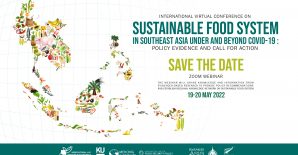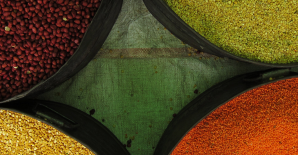News
World Bank Supports Innovative Social Assistance Project in Armenia
A grant agreement for the Promoting Social Inclusion and Self-Reliant Livelihood Activities in Armenia project has been signed. The grant, provided by the Japan Social Development Fund, includes $2.7 million over three years to increase social assistance benefits and self-employment support for 11,000 Armenians. The project was designed by the World Bank in partnership with Armenia’s Ministry of Labor and Social Affairs, and will be implemented by the Association of Social Workers, an NGO in Armenia. - The World Bank
IMF approves financial disbursements to Tajikistan and Kyrgyzstan to aid in COVID-19 Response
The IMF has approved disbursements of $121.1 million and $189.5 million to Kyrgyzstan and Tajikistan, respectively, to help the countries offset expenses resulting from mitigating the economic effects of COVID-19. For Kyrgyzstan, the funds fall under the Rapid Financing Instrument and the Rapid Credit Facility, while Tajikistan's come through the Rapid Credit Facility. - International Monetary Fund
Uzbekistan expands transport subsidies for exporters
So far, Uzbekistan has lost $400 million due to a lower volume of exports caused by the global economic slowdown and a drop in energy prices, even as increased commodity values offset some losses. Perhaps to contribute to rectifying this, Uzbekistan is expanding transport subsidies for domestic exporters of certain products. The subsidies will apply to deliveries made since April 1, 2020. - kun.uz
ADB Provides Financial Support for Mongolia's COVID-19 Response
This week, the Asian Development Bank has approved two financing packagers to assist Mongolia in its response to COVID-19. The first provides $30 million to boost the capacity of hospitals to diagnose and treat COVID-19. The second is a $100 million loan to the Government of Mongolia to help contain the spread of COVID-19 and to provide support to poor and vulnerable groups via cash transfer. - Asian Development Bank
Analysis & Related Information
COVID-19 Analyses: IFPRI Blogs
IFPRI is facilitating an ongoing blog series to discuss COVID-19 as it relates to food security and development at the global, regional, and country levels. Though some concern specific countries, the insights are applicable to others as the world collectively experiences the impacts of the pandemic. This week, IFPRI researchers explore the economic impacts of COVID-19 lockdowns in Africa. Another blog examines the same topic, but specifies it to South Africa. Finally, IFPRI researchers highlight the COVID-19 Food Price Monitor, which tracks commodity prices in certain regions. - IFPRI Blogs
Virtual Event - Food Loss and Waste – Can we end it by 2030 while dealing with the COVID-19 pandemic?
IFPRI has been hosting virtual events to discuss various issues related to food and agriculture policy. Videos like this will periodically be posted publicly after being streamed live, and will include presentations from researchers, discussion between researchers, and Q&A. This week's seminar mainly addressed the likelihood of ending food loss and waste by 2030 in line with the 2030 Agenda for Sustainable Development, especially in light of COVID-19. It features speakers from IFPRI, the Government of Denmark, USDA, and more. - IFPRI
Food security in the time of coronavirus breifing: the Caucasus and Central Asia
This article summarizes the state of food security in countries in the Caucasus and Central Asia. Each country is experiencing unique challenges to food security in the wake of COVID-19, and each has implemented different policies to varying effects. - Eurasianet
Coronavirus and commodity markets: Lessons from history
Although COVID-19 presents an unprecedented global challenge, it may be useful to compare the current situation to previous economic disruptions and recessions to understand the responses of commodity markets. The drop in oil prices is greater and more rapid than what has been seen in previous crises. Metal prices are also particularly affected, though COVID-19 hasn’t yet had a greater effect than past crises have. Typically, agricultural demand has been less affected by recessions, and the same is currently true. But, as the article points out, a high demand for agricultural products does not necessarily indicate little risk to food security, as supply chains continue facing disruptions. - World Bank Blogs
Publications & Reports
Do no harm? Field research in the Global South: Ethical challenges faced by research staff
Kaplan, L., Kuhnt, J., Steinert, J. 2020. World Development, Vol. 127.
Electronic Payments Acceptance Incentives – Literature Review and Country Examples
Alper, A. et al. 2020. Working Paper No. 148297, Washington D.C.: World Bank Group.
Jobs' Amenability to Working from Home : Evidence from Skills Surveys for 53 Countries
Hatayama, M. et al. 2020. Policy Research Working Paper No. 9241, Washington D.C.: World Bank Group.
Improving Water, Sanitation, and Hygiene in Schools: A Guide for Practitioners and Policy Makers in Mongolia
ADB Publication. 2020. Manila, Phillipines.: Asian Development Bank
Social Protection and Jobs Responses to COVID-19:
A Real-Time Review of Country Measures
Gentilini, U. et al. 2020. Working Paper No. 148335, Washington D.C.: World Bank Group.
Survival of Firms during Economic Crisis
Bosio, E. et al. 2020. Policy Research Working Paper No. 9239, Washington D.C.: World Bank Group.
The COVID-19 Pandemic : Shocks to Education and Policy Responses
World Bank Publication. 2020. Washington D.C.: World Bank Group.
Useful Links & Commentaries on Research Methods, Data & Publications
The data behind your data
Berk Özler. 2020. Development Impact, World Bank Blogs.
Translating SDG metadata: Improving transparency and capacity development for 2030 and beyond
Buyant Khaltarkhuu et al. 2020. Data Blog, World Bank Blogs.
Events & Announcements
Call for Proposals: Case Studies on Food Policy and Nutrition in the Eurasian Region
Researchers from Armenia, the Kyrgyz Republic, Russia, Tajikistan, and Uzbekistan are invited to apply for participation in a case study competition organized by the World Bank and the Eurasian Center for Food Security. Specifically, proposals for case studies concerned with the impact of COVID-19 on food security and nutrition in Eurasia are requested. Applications will be accepted until May 31, 2020. For detailed information on guidelines, requirements, etc., please follow the link.
Virtual AFE Seminar Series
A virtual seminar series organized by John List of the University of Chicago Department of Economics and Robert Metcalfe of Boston University's School of Business is being hosted weekly on Zoom. Each seminar will include a research paper presentation and Q&A, starting at 12pm EST on Wednesdays. Follow the link to view the full schedule of presenters and to sign up for invitations to the live seminar. Presentations will also by uploaded to a YouTube playlist. This week's presentation will be delivered by Nobel Prize winning economist Michael Kremer, titled "Water Quality and Child Survival: A Meta-Analysis."
Online Agriculture and Resource Economics Seminar
Dr. Marc F. Bellemare and PhD candidate Jeff Bloem will be hosting a weekly (Wednesdays, 11am CST) online seminar to discuss various research topics related to agricultural economics, nutrition, and food security. For example, the next seminar on May 13 includes a presentation of the paper, "The adaptive benefits of water markets" by Fran Moore et al. Follow the link for registration information and a schedule of upcoming seminars.
Development Policy and COVID-19: eSeminar Series
The World Bank's Development Research Group is hosting an online seminar series for discussions on development policy as it relates to COVID-19. The seminars are completely public, do not require an application or sign-up, and will continue for the foreseeable future.
IFPRI Virtual Policy Seminars
Due to COVID-19, IFPRI is periodically hosting virtual policy seminars to allow direct engagement with researchers and to convey analysis about related issues. These seminars include presentations, discussions, and Q&A. Please follow IFPRI on Twitter to receive notice of future seminars.
If you would like us to add your colleagues to our mailing list, please direct them to the following link.
The articles included in this news digest have been generated from online sources. Any opinions stated herein are not representative of, or endorsed by, the International Food Policy Research Institute or its partners.



